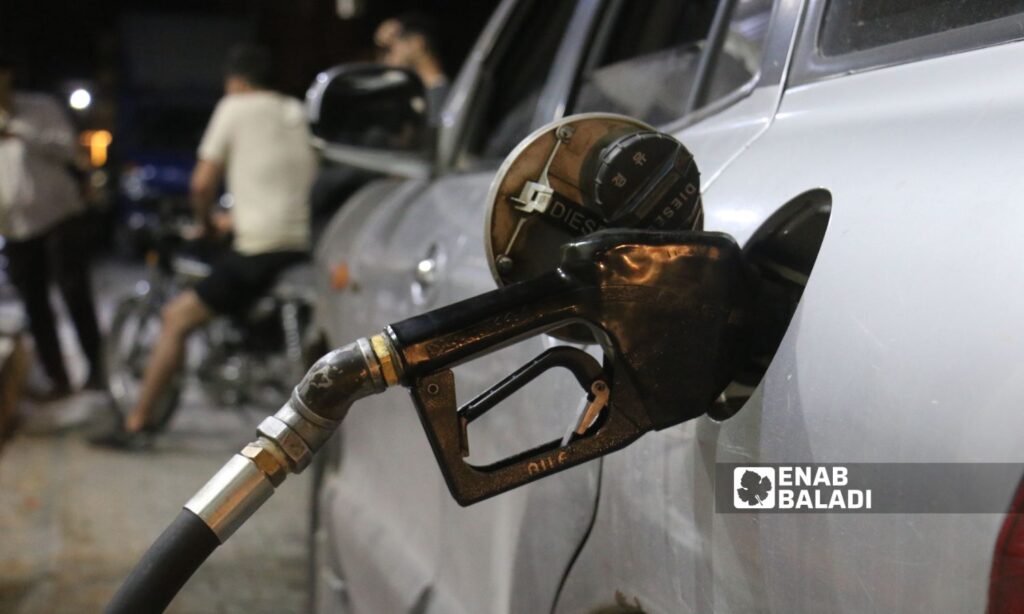Aleppo countryside – Dayan Junpaz
Fuel prices in the northern countryside of Aleppo are witnessing a noticeable increase, with a constant historic depreciation of the Turkish lira against the US dollar over the past few weeks. Such a rise affects the living conditions of residents and thousands of the displaced in the opposition-held areas.
The decline in the price of the Turkish currency was reflected in the prices of fuel, consumer, and service products, according to what was monitored by Enab Baladi in the border city of Azaz, north of Aleppo.
The price of a domestic gas cylinder reached 330 Turkish liras, a liter of regular gasoline 30 liras, a liter of European diesel 23.5 liras, and a liter of processed diesel 14.5 liras.
The income of poor and limited-income families ranges between 2000 and 3,000 TL in the areas controlled by the Turkish-backed Syrian National Army (SNA) in the northern countryside of Aleppo, as monitored by Enab Baladi.
Unprecedented hike
Nour Derbala, owner of a gas station in Azaz, told Enab Baladi that the price of a domestic gas cylinder has increased from 280 to 330 TL, a liter of gasoline from 22 to 30 liras, a liter of European diesel from 19 to 23.5 liras, and a liter of processed diesel from 11 to 14.5 liras.
The Turkish lira is witnessing a rapid decline in its value against the US dollar, recording unprecedented levels in its history.
($1=27 TL, according to the Döviz website, which specializes in exchange rates and currencies.)
The areas under the SNA control deal with the Turkish lira as the local currency, and thus prices there are affected by the low exchange rate.
According to Derbala, the price hike came based on the decline in the price of the Turkish lira against the US dollar.
Increased cost to the population
Mohammed Rabi’, 30, works in a shop in Azaz. He told Enab Baladi that he prefers to walk on his way to work instead of using his motorcycle because he is unable to secure daily fuel due to his monthly income, which does not exceed 2000 TL.
Rabi’ added that the rise in fuel prices had a great impact on various aspects of life after people believed that dealing in the Turkish lira would spare them the issue of price instability, pointing out that the region is witnessing a rise in prices that affects all the requirements of daily life.
Mohammed Khani, 42, a taxi driver, explained to Enab Baladi that taxis in Azaz, especially those that depend on gasoline, are operating at a loss today with the change in the exchange value of the lira against the US dollar and the rise in the price of a liter of European gasoline to imaginary rates, especially since fuel is sold at gas stations according to the exchange rate.
Khani refuses to deliver his customers to remote places that force him to consume a lot of fuel, except with a prior agreement with the customer to bear the cost of the price increase.
Taxi fares have increased due to the high cost of fuel, and while the fare for transportation between Azaz and Afrin ranged between 300 and 400 TL as a maximum, it now exceeds 500 TL, according to Khani, which causes many problems.
For his part, Mohammed al-Hamidi, 25, who works in a medical clinic in Azaz, told Enab Baladi that he had not traveled by taxi for several months and that commuting on foot had become normal for most of the residents, with great reliance on motorcycles and on minibusses to move outside the city.
Al-Hamidi considered that the daily income of families in the rural areas of Aleppo is not sufficient for food and that an employee in institutions or a day laborer needs half of his salary to pay for transportation costs from his home to his place of work and vice versa, in the event that he does not own a motorcycle or a car and relies on private cars for transportation.
The general level of prices witnesses frequent, almost daily rises, affecting commodities, basic materials, and food, which doubles the lack of purchasing power.
Most Syrians resort to relying on more than one source in an attempt to balance income and expenses, the most prominent of which are money transfers from expatriates outside Syria, and relying on second businesses, while families dispense with the basics in their lives and reduce their spending rate.
On December 1, 2022, the local council in the city of Azaz in the northern countryside of Aleppo announced an increase in the salaries of employees in the public sector in all educational, health, security, and military fields.
The minimum salary for an employee in the public sector, after the increase decision, is 1,140 Turkish liras, and it is granted to single Muezzin (the person who recites the call to prayer) and single cleaner, while mosque muezzins and married cleaners receive a salary of 1,235 Turkish liras.
According to the increase, the teachers’ salary reached 1,750 TL for singles and 1,925 TL for married people.











